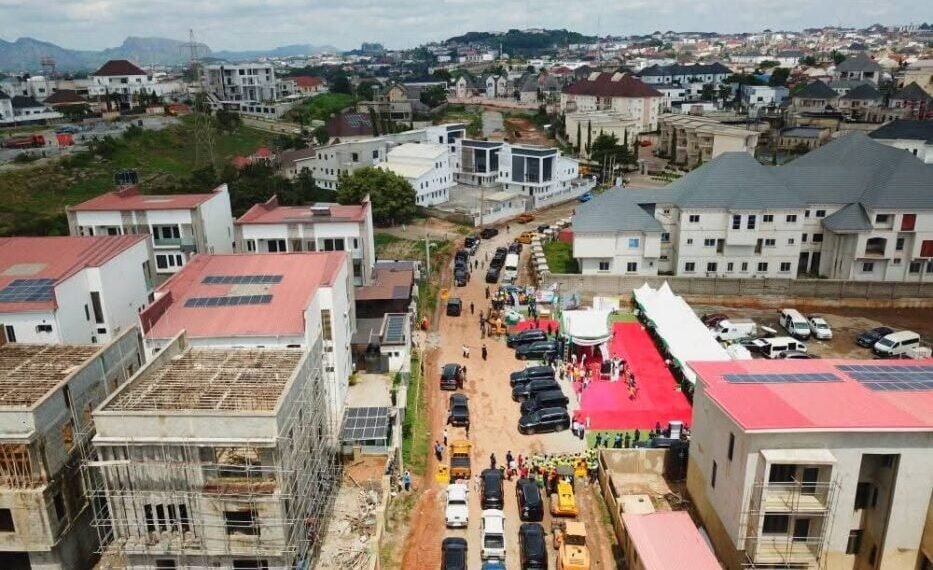With the recent controversy and tensions between the Federal Capital Territory Administration (FCTA) and local area councils, Minister of the Federal Capital Territory (FCT) Nyesom Wike has issued a stern warning to Christopher Maikalangu, the Chairman of the Abuja Municipal Area Council (AMAC). During a public event on October 8, 2025, Wike accused the AMAC leadership of engaging in arbitrary street naming practices, allegedly driven by financial incentives from wealthy individuals.
He emphasized that streets constructed under his administration’s infrastructure projects cannot be named without proper oversight, declaring, “You can’t name streets in roads I constructed.”
This incident has reignited a long-standing debate over authority in Abuja’s urban planning, particularly regarding who holds the legal power to name streets and roads.The controversy stems from reports of “street naming for cash,” where AMAC officials are said to assign names to roads in exchange for payments, often favoring affluent donors without regard for their contributions to national development.
Wike described this as the “sale of street names” by unscrupulous officials, warning that such practices undermine the integrity of Abuja’s city planning.
He directed Maikalangu to adhere to due process, insisting that the FCTA must be informed and approve all names to ensure they honor individuals who have meaningfully contributed to the city or country.
“You don’t just wake up because somebody has N2 million and then name a very important street after him,” Wike stated, adding that future naming must prioritize national heroes over financial benefactors.
This is not the first time such issues have surfaced. In early 2023, the FCTA revealed plans to prosecute “cartels” involved in illegal street naming, highlighting corruption within the system.
Wike’s latest caution also included threats of sanctions, including potential dismissal for the AMAC Chairman and related officials if the practices continue, framing it as a broader push against racketeering in public services.
The Minister’s stance aligns with his administration’s focus on infrastructure development, such as ongoing projects in areas like Guzape and Asokoro, where he vowed to prevent unauthorized alterations.
Legal Framework: Who Is Empowered to Name Streets and Roads in Abuja?
At the heart of this controversy lies the question of legal authority over street naming in the Federal Capital Territory (FCT). Abuja’s unique status as the nation’s capital, governed under a hybrid system of federal and local powers, has led to overlapping claims between the FCTA and area councils like AMAC.
The 1999 Constitution of the Federal Republic of Nigeria (as amended) provides the foundational legal basis. Section 297 establishes the FCT, Abuja, with boundaries defined in Part II of the First Schedule, and vests ownership of all lands in the federal government.
Critically, Section 299 stipulates that the Constitution applies to the FCT as if it were one of the states of the Federation, with adaptations for its administration.
Section 303 specifies that the FCT comprises six area councils, whose administrative structure is determined by an Act of the National Assembly.
The specific power to name roads and streets is outlined in the Fourth Schedule, Part I, Section 1(g), which assigns to local government councils (and by extension, FCT area councils) the function of “naming of roads and streets and numbering of houses.”
This is reinforced by Section 7, which guarantees a system of democratically elected local governments, and Section 318, which interprets related provisions.
These sections collectively empower area councils like AMAC to handle such matters, treating them akin to local governments in other states.
However, the FCTA, led by the Minister (who exercises powers delegated by the President under Section 302), oversees broader territorial administration, including urban planning through agencies like the Abuja Metropolitan Management Council (AMMC) and the Federal Capital Development Authority (FCDA).
This has created friction, as the Minister often asserts oversight to ensure alignment with national standards.
The 2023 Court Ruling: A Landmark Decision
A pivotal moment came in January 2023 with a ruling by the High Court of the Federal Capital Territory in the case of Chief Obidi Ume v. AMAC, FCDA, and AMMC (Suit No. CV/2083/2022).
Read also:
- Residents of Abuja’s Lokogoma Area Call on Wike, Egbetokun to halt forced eviction of their homes
- Tinubu: Wike-Led FCTA opening Abuja for business, housing, investment
- Wike plans major reorganization to FCT transportation
Justice Edward Okpe declared that the AMMC and FCDA lack the authority to name streets, roads, or number houses in Abuja, affirming that only AMAC holds these powers for all area councils.
The case arose when Ume, after paying fees to AMAC for a street named in his honor, saw it demolished and renamed by AMMC officials.
The court ruled the AMMC’s actions illegal, ordering the restoration of the original name, removal of unauthorized signposts, and N25 million in damages against the FCDA and AMMC.
It also issued a perpetual injunction against further interference by these bodies.
The judgment relied on constitutional provisions, including Sections 7, 303, 318, Part II of the First Schedule, and Section 1(g) of the Fourth Schedule, emphasizing that street naming is a local government function exclusive to area councils.
Despite this, the ruling was appealed by the FCTA, indicating ongoing legal disputes.
Wike’s caution to the AMAC Chairman highlights persistent power struggles in Abuja’s governance, where federal oversight clashes with constitutional local autonomy. While the 2023 ruling bolsters AMAC’s position, the appeal and Wike’s directives suggest the FCTA seeks greater control to curb alleged corruption.
Critics argue this could undermine the constitutional framework, while supporters see it as necessary for orderly development.As Abuja continues to expand, resolving this through higher courts or legislative clarification may be essential. For now, the controversy remains until the final conclusion of the appeal and possibly Supreme Court Judgement.






